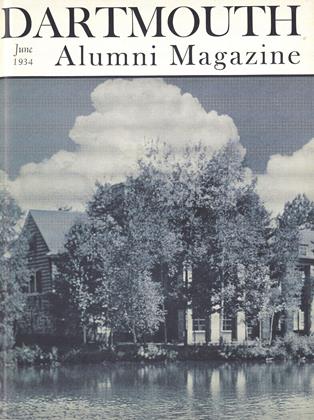For the first time within our memory Socialistic and Communistic influences have this year played a role in the intellecual life of the campus. The chief reason is found in five or six seniors, intellectually representing the upper crust of their class, who are staunch supporters of leftish doctrines and rabid opponents of anything with capitalistic tints. In their radical newspaper which came out some ten times during the college year (and which has now discontinued publication because of lack of student support) they have attacked with "red" gusto everything from our capitalistic College to the conservative daily Dartmouth. Though evoking little attention among the student body as a whole, this group has carried their banner with vigor and avidity. Articles and cuts from the New Masses have been reprinted in their paper, and editorials by their most active comrade, Charles B. Strauss '34, of New York City, have appeared in the communistic organ Fight.
Off and on during the year, this group had locked horns with the daily Dartmouth, which, like most of the campus, did not take them too seriously. On International May Day, however, Tom Lane '35, of Hartford, Conn., threw down the gauntlet to the young "reds" with a definite capitalistic stand in his Dartmouth editorial column. "Marx's theories," claimed his article entitled "The Ghost of May Day," ". . . . have for the most part been disproved by the facts of time." Marx's three corner stones—the economic interpretation of history, the doctrine of the class struggle, and the concept of surplus value—were, he argued, fallacious, and .. . capitalism, far from containing within itself the roots of its own destruction, is in its flexibility possessed of the power to survive. Neither communism [nor] socialism .... have any place in the American scheme of free private enterprise and individual liberty."
The Dartmouth "red" leaders took the editorial as a personal affront as well as a desecration of the living spirit of Karl Marx, and quickly gathered their comrades i nto council to prepare a vox pop in answer, to which they obtained in addition to their own the signatures of several sympathetic members of the faculty. In their long thirty-inch letter, however, the young Marxists, composed for the most part of English and Art majors, stuck out their necks a little too far; for their arguments, which were in part based on insufficient knowledge of Marx's principles, gave Editor Lane, an economics major, a chance to come back and make the signers of the voxpop look a little foolish. The controversy quieted down as quickly as it arose—the last pertinent remark heard being that of a freshman who innocently asked, "Who is this Marx fellow, anyway?"
Whether it is an evidence of mental lassitude and lack of social foresight, or the indication of a healthy and sound state of undergraduate opinion (according to your own beliefs), the tenets of the left wingers have in recent years had relative little support at Dartmouth when compared with institutions like Columbia and Chicago. Hanover has experienced none of the mass meetings and communist demonstrations like those that have disrupted classes and enraged administrative officials on Morningside Heights. And now, with its most active undergraduate supporters graduating this month, the radical cause at Hanover appears to have little future for the coming year. The '34 "reds" leave behind a few associates, but at most they are little more than pale, pink stooges.
 View Full Issue
View Full Issue
More From This Issue
-
 Class Notes
Class NotesClass of 1923
June 1934 By John C. Allen, "Graham Whitelaw" -
 Article
ArticleHANOVER BROWSING
June 1934 By Rees H. Bowen -
 Class Notes
Class NotesClass of 1910
June 1934 By Harold P. Hinman -
 Sports
SportsBaseball
June 1934 By C. E. Widmayer '30 -
 Class Notes
Class NotesClass of 1908
June 1934 By L. W. Griswold -
 Class Notes
Class NotesClass of 1914
June 1934 By Edwrd Leech, Ed Leech







